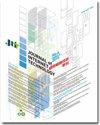无线传感器网络分层模型的α-分数优先策略
IF 1.2
4区 计算机科学
Q4 COMPUTER SCIENCE, INFORMATION SYSTEMS
引用次数: 103
摘要
能量空洞是指在数据采集汇附近的关键问题,这个问题在很大程度上影响了无线传感器网络的寿命。从分布式传感器到汇点的频繁数据转发将加速汇点附近传感器的能量消耗。这种情况缩短了传感器网络的寿命。本文提出了一种α-分数优先的策略来建立一个考虑能耗的无线传感器网络分层模型。该模型将所谓的中继节点混合到网络中,用于传输和收集来自其他传感器节点的数据。我们研究了最远优先遍历和哈雷方法,然后将所提出的α-分数优先策略分别与这两种方法相结合。为确定传感器网络中的中继节点,设计了三种算法:FF+Fr(α)、HD+Fr。该算法可用于构建中继节点比最远优先遍历和哈雷尔方法少的双层传感器网络。所提出的策略也可以与关于从许多选项中选择一个的任何其他算法一起使用。仿真结果表明,我们提出的算法性能良好。因此,可以延长网络寿命。本文章由计算机程序翻译,如有差异,请以英文原文为准。
α-Fraction First Strategy for Hierarchical Model in Wireless Sensor Networks
Energy hole refers to the critical issue near the sinks for data collecting, this problem effects the lifetime of wireless sensor network to a great extent. Frequently data forwarding from distributed sensors to the sink will speed up the energy consumption of the sensors near the sink. This circumstance shortens the lifetime of the sensor network. In this paper, an α-fraction first strategy was proposed to build a hierarchical model of wireless sensor networks that concerning the energy consumption. The model mixes the so-called relay nodes into the network for transmitting and collecting data from the other sensor nodes. We studied the Farthest First traversal and Harel methods, then combined the proposed α-fraction first strategy with the two methods respectively. Three algorithms of FF+Fr(α), HD+Fr(α), and HL+Fr(α) were designed for determining the relay nodes in sensor networks. The algorithms can be used to construct a two-tier sensor network with fewer relay nodes than the results of the Farthest First traversal and Harel methods. The proposed strategy also could be used with any other algorithms that regarding for choosing one of many options. The simulation results show that our proposed algorithms perform well. Thus, the network lifetime can be prolonged.
求助全文
通过发布文献求助,成功后即可免费获取论文全文。
去求助
来源期刊

Journal of Internet Technology
COMPUTER SCIENCE, INFORMATION SYSTEMS-TELECOMMUNICATIONS
CiteScore
3.20
自引率
18.80%
发文量
112
审稿时长
13.8 months
期刊介绍:
The Journal of Internet Technology accepts original technical articles in all disciplines of Internet Technology & Applications. Manuscripts are submitted for review with the understanding that they have not been published elsewhere.
Topics of interest to JIT include but not limited to:
Broadband Networks
Electronic service systems (Internet, Intranet, Extranet, E-Commerce, E-Business)
Network Management
Network Operating System (NOS)
Intelligent systems engineering
Government or Staff Jobs Computerization
National Information Policy
Multimedia systems
Network Behavior Modeling
Wireless/Satellite Communication
Digital Library
Distance Learning
Internet/WWW Applications
Telecommunication Networks
Security in Networks and Systems
Cloud Computing
Internet of Things (IoT)
IPv6 related topics are especially welcome.
 求助内容:
求助内容: 应助结果提醒方式:
应助结果提醒方式:


